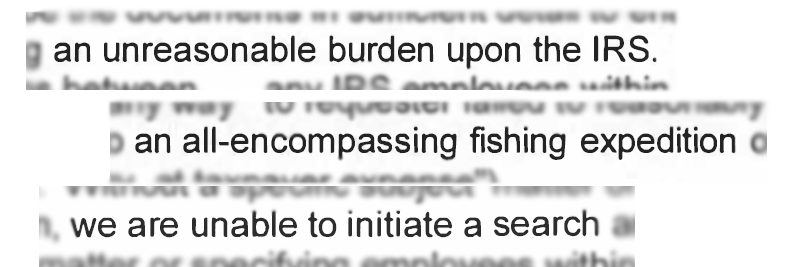It seems like a simple idea – the Freedom of Information Act (FOIA) allows any interested citizen to request documents from the people and agencies who exercise power over them. Elected officials have called it “our nation’s premiere transparency law” and one which serves a “crucial need … for open access to government information.” Unfortunately, as one recent case shows, the process rarely works this way, leading to frustrating and sometimes bizarre results.
In 2014, Cause of Action Institute became concerned that lawyers employed by the Tax Division of the Department of Justice (DOJ) were being detailed to work at the White House. At least two of these attorneys had access to the confidential taxpayer information of administration opponents because of their prior work on lawsuits connected to the IRS “targeting” scandal, and giving them this kind of assignment was unprecedented. Taxpayer information would normally be kept private from White House officials, including the president, but now a pipeline had been opened where such information could reach political appointees. [See our investigative report discussing this issue in greater detail]
 [Excerpts from IRS letters complaining about having to search its own records. CoAI would later discover a search had already taken place]
[Excerpts from IRS letters complaining about having to search its own records. CoAI would later discover a search had already taken place]
The IRS has a long history of misusing tax information, one that reaches as far back as FDR. Without proper procedures or training, the same kind of misconduct will inevitably happen again no matter which political party is in charge. To find out more about the attorney transfers and whether any steps had been taken to safeguard taxpayer privacy, we submitted a FOIA request to the Internal Revenue Service (IRS) for e-mails between three attorneys assigned to the White House and the IRS division at the heart of the targeting scandal.
The request was sent in January 2014. The first reply arrived a month later, but it was merely notification that the agency would be “unable to send the information” within the 20 business days required by FOIA. A second delay letter arrived in May, followed by a third delay in August and yet another delay in December.
Finally, in April of the following year – a full 282 business days after the 20 business-day deadline – we received a response. But it was not the e-mails we requested; it was a notice that our request was now too broad and would be closed because searching the e-mails of three people was “an unreasonable burden upon the IRS.” Even if this were true, which seemed very unlikely, the agency had violated its own rules by dragging out the process and then failing to give us a chance to narrow the request before rejecting it. We pointed out these problems in an appeal of the IRS decision, but the agency refused to acknowledge these problems and again rejected our request.
In an attempt to figure out how the process had gone so wrong, we submitted another FOIA request in May 2016 requesting the “processing notes” for the original request. These notes document what happens to a request once it arrives at a government agency. They are internally made, follow a particular format, and should be among the simplest of documents to locate and share. Yet the first delay letter soon arrived, and another one three months later. Not wanting to wait for a third delay notification, we filed a lawsuit against the agency to get a full explanation of what happened.
Such lawsuits are often required to get a meaningful response from the government, and ours finally forced the IRS to release the processing notes for our original request. So what was the explanation for the agency refusing to conduct a simple search – and taking over a year to say so?
Apparently, there wasn’t one. The IRS tax law specialist processing the request had marked in her records all the way back in December 2014 that a search had been done and “produced no documents.” This happened four months before the IRS called our request “an unreasonable burden,” seven months before the agency claimed it was “unable to initiate a search” at all, and a full two years before we filed suit just to discover the IRS could have saved everyone time and money simply by reporting its original findings.
Why would government officials compare our request to “an all-encompassing fishing expedition” if they already knew there weren’t any fish to catch? The answer, if there is one, remains to be seen. The original FOIA request is the subject of a separate and ongoing lawsuit, but the IRS has not yet produced any responsive documents. If no improper communication took place between the lawyers transferred to the White House and their former IRS colleagues, then that is good news. If no ethics training was given to those lawyers, then that good news is merely a coincidence. Whatever the truth turns out to be, it is a worrying sign that a simple request can result in years of delays, constant obstruction, contradictory answers, and no solid explanation for any of these.
John McGlothlin is counsel at Cause of Action Institute